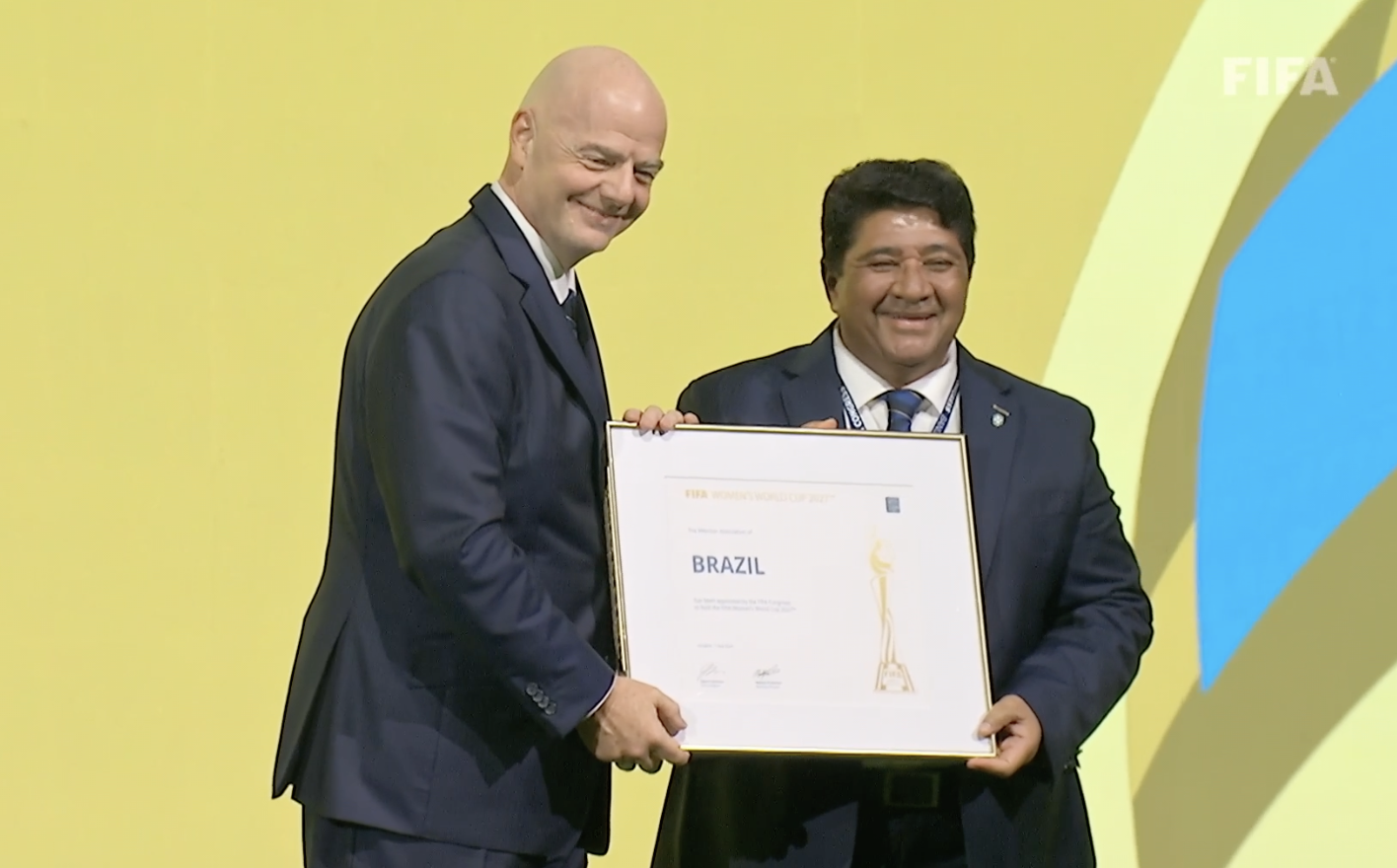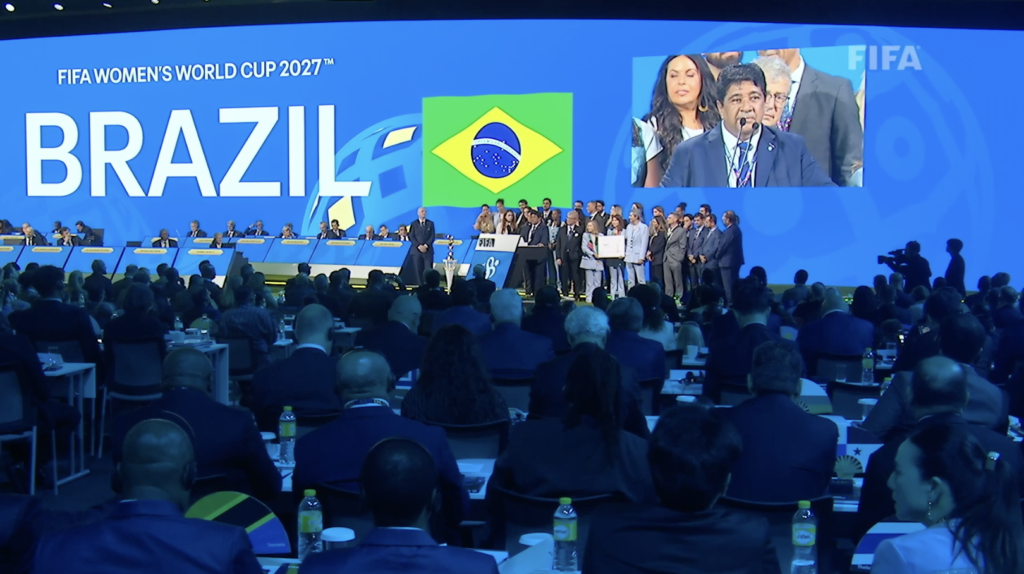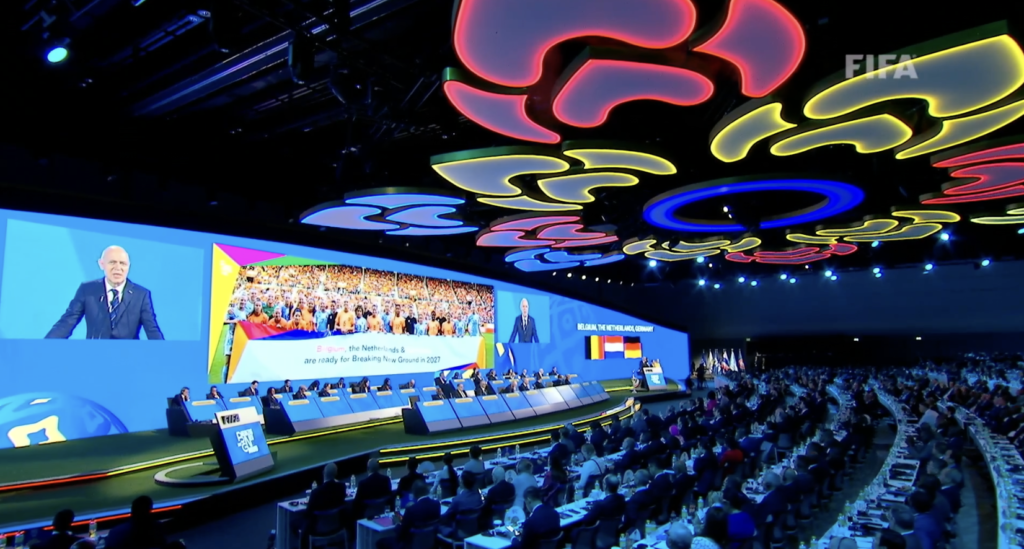Brazil’s success in winning the vote to host the 2027 Women’s World Cup at the FIFA Congress in Bangkok last Friday will undoubtedly provide a stimulus to, until now, a generally unloved women’s game in the country.
The success over the Belgium-Netherlands-Germany (BNG) joint bid was significant – both for South American women’s football and in assessing where power currently lies in the murky world of football politics, and who is manipulating it.
FIFA seems a little reluctant to go to a competitive vote on pretty much anything these days. The biggest examples are the last two uncontested bids for the organisation of the 2030 and 2034 men’s World Cups, and the, to all intents and purposes, bid-less awards of five consecutive men’s U-17 World Cups to Qatar and five consecutive U-17 Women’s World Cups to Morocco.
The men’s World Cup 2030 has become the compromise of all compromises with the opening three matches taking place in South America, before a journey to the other side of the world for the rest of the tournament in Europe and North Africa. In terms of what a World Cup generally looks like, this one currently has the appearance of an all-round dog’s breakfast
That the BNG 2027 women’s bid even made it to the polls is perhaps a testament to their commitment to their very clear bid mission and a blind, if ultimately naïve, belief that they were competing on a level FIFA playing field.
When the bid evaluation reports were made public, the suspicion gently reverberated around Europe that the fix was in.
South Africa had dropped out of the bidding early while the USA decided, with three weeks to go, to pull out, instead saying it would bid for hosting 2031. The US decision was probably a smart one all-round, not least because the last time FIFA humiliated the US in a vote – the 2010 vote that awarded 2022 to Qatar – it led to the mother of all responses from the US Justice Department in 2015 that (for a while) branded FIFA a criminal organisation as it faced the US’s Racketeer Influenced and Corrupt Organizations (RICO) Act.
FIFA of course will not face that kind of backlash over the 2027 vote, but there will certainly be discussion over whether FIFA and its ‘weighted’ processes have abused and disrespected the governments backing the BNG bid.
In particular, can governments risk committing public money in what they believe and expect to be a fair, open and transparent bid process, but in reality might not be.
In the bid evaluation report Brazil came out top with a score of ‘4’ out of 5, against BNG’s 3.7. In actuality, Brazil’s 3.95 score was rounded up and BNG’s 3.73 was rounded down. Why?
The total scores are calculated out of 500. The difference between the two bids was 22 points. Was there a need for FIFA to create the perception of a gap between the bids that in reality barely existed?
Examining where the two bids differed, the weighting towards Brazil was due to the larger size of the 10 stadia they are proposing – stadia built for the 2014 World Cup, many of them only finished afterwards, most of them still looking for a commercial purpose.
Brazil also scored higher on the commercial element of the bid – presumably based on filling each and every one of their bigger stadiums to capacity.
How hard was the reality of this questioned? Is it truly realistic that Brazil could actually fill these cavernous stadia for the women’s game, and at what price point, and where are all these new-found women’s football fans in Brazil who would suddenly emerge in their millions?
It seems unlikely that there will be millions of travelling female fans because, although the bid evaluation report trumpeted safety and security in both Brazil and BNG as low risk, the reality is that they are far from being the same in comparison.
Brazil recorded 40,824 homicides in 2022 — an average of 111 violent deaths per day. This is the equivalent of one out of every five homicides in the world (multiple sources).
But in FIFA’s Brazil-tinted world the stadia will all be full of fans paying top Reals.
Interestingly another area that seemingly didn’t count towards the scores but was flagged up, was in the legal and compliance area. And this is truly a WOW moment.
FIFA’s bid inspectors found that the BNG bid represented a medium risk in the ‘government support document’ category, against Brazil’s low risk. While in the ‘legal contractual framework category’ the BNG bid represented a high risk (printed in loud red ink) against Brazil’s low risk (printed in a nice warm green).
On the basis it seems highly unlikely that Brazil can offer a contractual and government security higher than the three European nations (and Brazil repeatedly didn’t manage to deliver that contractual security in 2014). Surely in the post FIFA-gate world a believable, binding, and transparent set of legal agreements, backed by stable governments, is preferable to winging it on a promise of law changes and ‘whatever you want, you can have’ commitments.
It is also worth remembering that it was Brazilian and South American football execs who were at the centre of a bulk of the DoJ indictments with the Brazilians in particular still evading the US justice system by hiding behind a lack of an extradition treaty with the US.
FIFA even felt the need in Bangkok to roll out what felt like a rather apologetic BDO presentation saying that they had audited the report and can find nothing wrong with it. But of course an audit is only as good as its terms of reference.
With the bid evaluation report released, the two bids were passed to proceed to presentation to the FIFA Congress. The BNG bid went first and ticked a lot of boxes from development to environmental sustainability, and covered their ambition for the women’s game locally and globally.
Brazil went second and it was, well… shambolic. Video audio was lost at one point, the presentation failed to find a global theme but it certainly hammered home the point that Brazil is an incredible place and just really, really good at football.
Ultimately the presentations were only window dressing.
The real action had already seen the votes corralled. FIFA’s executive had whipped their favourite confederation into voting for Brazil while another of the big confederations had reportedly mandated (unconfirmed) their members to block vote for the Brazilians.
In an open vote where the bosses can see who voted for whom, go against them at your financial and FIFA-grants peril.
The real story isn’t about the BNG vs Brazil bid for 2027 – it just happens to have been highlighted within this bid process. There is of course a very strong argument for taking 2027 to South America on the principle of rotation – Europe hosted in 2019, South America have never hosted.
BNG lost in what is a much wider game being played where favours are delivered and banked with an eye on what is coming up next when those favours will need to be called in. Conmebol had more cards and FIFA’s executive to play with, and they played them for Brazil.
BNG ultimately didn’t have the same political capital which might also reflect FIFA’s often vehement anti-European stakeholder position – and the perception in many confederations that Europe is too colonial.
FIFA and its president have spent a lot of time since 2016 telling anyone who will listen that this is a radically reformed body with good governance at its heart. Nobody really believes that, least of all many people working within FIFA. But it doesn’t really matter as it is just rhetoric.
The question is really whether FIFA can be trusted by governments to conduct fair and open bidding processes that, as public institutions, they can commit significant amounts of public funds to. They couldn’t be trusted in 2010 when Russia was awarded 2018 and Qatar 2022. Has the situation changed in 2024?
It could be argued that the new FIFA is worse than the old. In 2010 it was corrupt individuals. Is what we are seeing now institutionalised corruption?
The song from the terraces might be ‘Same old FIFA, always cheating’.
Paul Nicholson is the editor-in-chief of Insideworldfootball. Contact him at moc.l1722023837labto1722023837ofdlr1722023837owedi1722023837sni@n1722023837osloh1722023837cin.l1722023837uap1722023837



